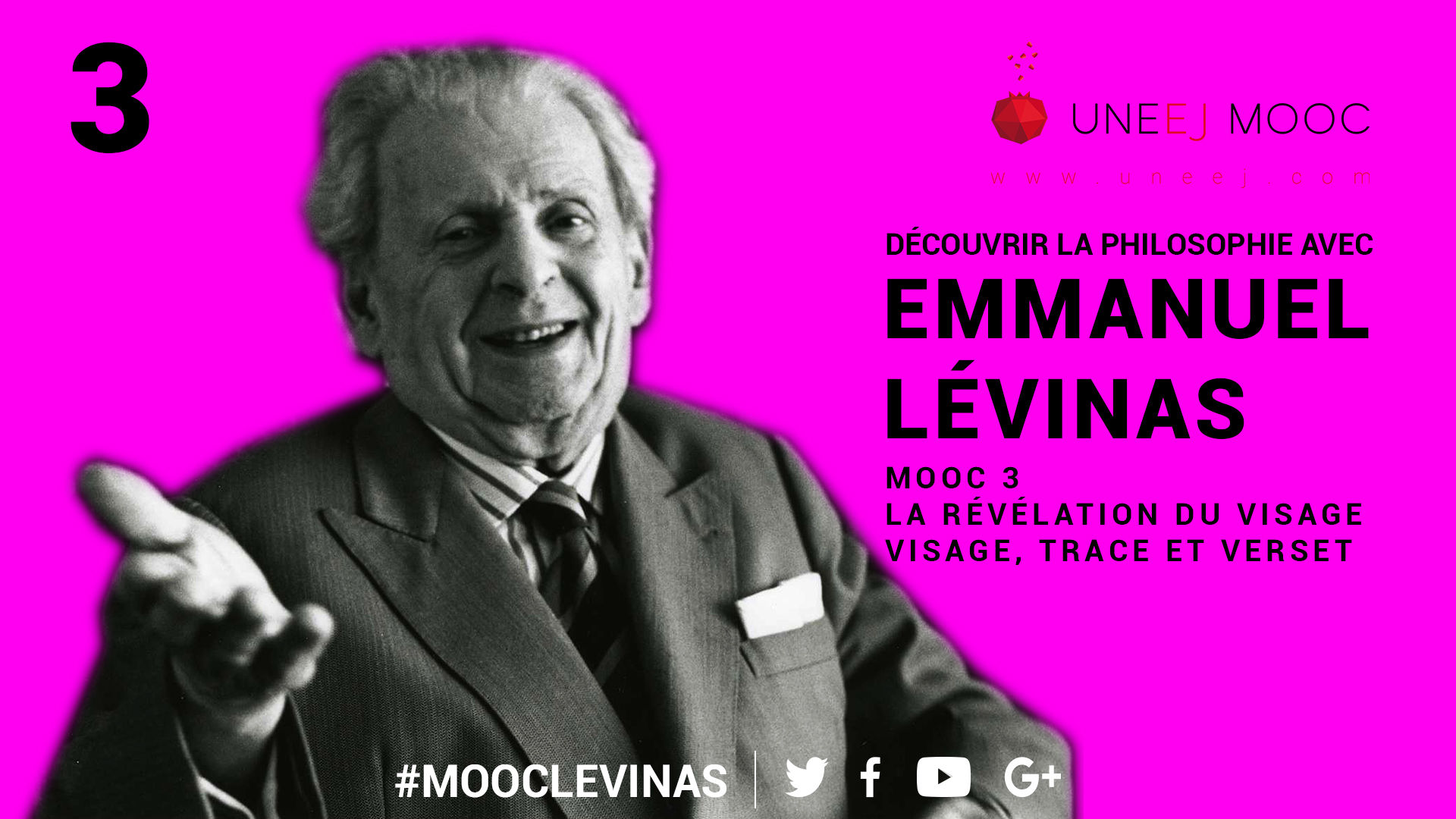May 15, 17 · Elizabeth Meade 15 May 17 Morality understood as autonomy is founded upon the premise that the subject is primarily free, self governing, and rational Within this tradition, moral responsibility is viewed as correlating with freedom 1 One is responsible for an act proportionate to whichNov 08, 14 · The Ethics of the Face to Face Encounter Schroeder, Levinas, and the Glance Author(s) EDWARD S CASEY Source The Pluralist, Vol 1, No 1 (SPRING 06), pp 7497 c'est i'autrui ?Emmanuel L?vinas, Totalit?Apr 30, 12 · Levinas, autrui et le visage – "Le moi, devant autrui, est infiniment responsable" – "Le visage de mon prochain est une altérité qui ouvre l'audelà Le Dieu du ciel est accessible sans rien perdre de sa transcendance, mais sans nier la liberté du croyant" – "Le visage est ce qui nous interdit de tuer

Pdf Otherwise Than Being With Levinas On Heidegger And Community
Levinas citation autrui
Levinas citation autrui-Autrui vous concerne même lorsqu'un tiers lui fait du mal, et par conséquent vous êtes là devant la nécessité de la justice et d'une certaine violence Le tiers n'est pas là par accident En un certain sens, tous les autres sont présents dans le visage d'autrui "Offrant ma joue à celui qui frappe"Le dilemne Ricoeur Levinas Pour résumer le dilemme qui opposa Ricœur à Lévinas nous partirons de cette formulation abrupte chez Ricoeur il y a une distinction entre l'éthique (qui concerne la « visée de la 'vie bonne' ») et la morale (qui concerne la loi et les rapports de justice) tandis que chez Lévinas cette distinction n



Pz9jd3geqbrmwm
Selon Levinas, il n'est en aucune manière pertinent de penser qu'autrui et moimême sommes deux individus appartenant à un même genre ou partageant une même essence Car autrui consisteDifficulty in articulating this point is a risk one runs with Levinas, and in the knowledge that he used forty years trying to say the "more" of "transcendence" 3 See his 1981 interview with Philippe Némo EI 51/EaI 52 4 Bettina Bergo, "Levinas's 'ontology' " in Emmanuel Levinas Critical Assessments of LeadingFamously, the dialogical dimension is central to Levinas' notion of ethical relationship, as the intersubjective relation is interpreted in terms of responsibility, that is, as the answer to the call of the other This relationship, however, is not exhausted in the IThou dimension, but finds its ultimate meaning in a third person, God (illeity) In this article, I am going to consider the
Levinas's explicit resistance to the incorporation of the phrase "as yourself" in the Judaeo‐Christian love command might seem to validate the critics' complaints The author argues, on the contrary, that Levinas does offer a strong and compelling conception of moral agency and that his ethics, properly understood, does not entailJul 03, 19 · Emmanuel Levinas (b 1906–d 1995) was a philosopher famous for having developed an original interpretation of Edmund Husserl's phenomenological method, using the latter to address the foundations of ethics and normativity Published in more than twentyfive books spanning over eighty years, his oeuvre can be divided into three categoriesLevinas's formal reflections on Jewish thought first appeared in a collection of essays published in 1963 as Difficile liberté (Difficult Freedom) In his interpretations of the Talmud, he seemed to be searching for what he called "a wisdom older than the patent presence of a meaninga wisdom without which the message buried deep within the enigma of the text cannot be grasped"
ALTERITY The term alterity derives from the Latin word alter, which means "other" In contemporary philosophy the question of the other is primarily that of the other human being, the Other (Autrui, in French), although some thinkers have raised the question of whether the human other should be privileged in this way However, the central question governing philosophical discussions ofMar 26, 09 · Le visage d'autrui peutil nous apparaître lorsqu'il est de dos ?LEVINAS, EMMANUEL(1906–1995) Emmanuel Levinas was born in Kaunas, Lithuania, of Jewish parents His education familiarized him with the Hebrew Bible and the Russian novelists After having studied at the gymnasiums in Kaunas and Charkow, Ukraine, he traveled to Strasbourg, where he studied philosophy from 1924 to 1929



Pdf Otherwise Than Being With Levinas On Heidegger And Community



Citation Emmanuel Levinas Autrui Comprendre Une Personne C Est Deja Lui Parler Poser L Existence D
Levinas' philosophical writings share with his religious thought a concern for interpersonal relations;Jun 12, 17 · Initially one of Heidegger's most devoted followers, Levinas became very critical of Heideggerian philosophy, and the latter's flirtations with Nazism seem to have played a pivotal role in this development (Peperzak 1993 4;14 Two years prior to the publication of Totality and Infinity , Levinas' 1959 talk, "Audelà du possible", explored the theme of the other as hostile, as enemy, or as a source of violence (LO2 305–306) It shows that he was aware of alterity as a source of struggle 15



Autrui


Citation Parole Metz P Tits Bonheurs
Levinas's son, Michaël, a noted pianist and composer born in 1949, made the final decision to have them published anyway, as his father's literary executor As Michaël Levinas told theLevinassienne et la conception de la relation à autrui qu'il développe dans Soimême comme un autre en est empreinte Cependant, Ricœur refuse de suivre Levinas jusqu'au boutNote Citations are based on reference standards However, formatting rules can vary widely between applications and fields of interest or study The specific requirements or preferences of your reviewing publisher, classroom teacher, institution or organization should be applied



Citation Emmanuel Levinas Comprendre Une Personne C Est Deja Lui Parler Poser L Existence D Autrui En La Laissant Etre C Est Deja Avoir Accepte Cette Existence Avoir Tenu Compte D Elle Emmanuel Levinas



Pdf Ethics Sublimity And Hospitality Levinas And The Romantics
The late modern and postmodern theme of homecoming permeates the philosophy of Martin Heidegger, who grapples with the topic throughout the various phases of his lifelong meditation on Being Heidegger continually gave thought to the relationship between Being and the place or site in which it becomes manifest, whether it is a system of references and manipulable entities (BeingLEVINAS' NOTION OF THE „THERE IS" 1 by Philip LAWTON (South Hadley, USA) Emmanuel Levinas' work, in this (as in other ways) reminiscent of Rosenzweig's and Buber's 2, gives a tripartite articulation to Being The three dimensions orApr 27, 09 · Mais Lévinas ne dit pas qu'il est impossible de mener une existence morale sans avoir la foi Seulement, en conformité aux livres sacrés, il estime que dans la relation à Autrui se décèle la trace de la divinité



Entre Nous Essais Sur Le Penser A L Autre Babelio



Levinas Dissertation Martin Heidegger Jacques Derrida
En 1980, le célèbre philosophe français Emmauel Lévinas, réputé hermétique, accorde une série d'entretiens à Philippe Nemo, pour l'émission Les Chemins de laAbstract In this article I test Levinas' wellknown presentation of alterity in the context of Pinter's two most wellknown absurd dramas, The Birthday Party and The Caretaker, where condensed everyday life situations present some extraordinary encounters with OthersHarold Pinter has proved to be the most prominent dramatist of alterity, whose work can be seen in many ways toCrossRef citations to date Altmetric Research articles The grammar of Levinas' other, Other, autrui, Autrui Addressing translation conventions and interpretation in Englishlanguage Levinas studies Dino Galetti Department of Philosophy, University of Johannesburg,



L Etrange Aventure De La Paternite Selon Emmanuel Levinas Persee



Emmanuel Levinas Les Limites Du Savoir Youtube
Connaître autrui, l'amant se lance à la poursuite d'un absolu qui est a bso lument en dehors de lui, mais cet élan se brise aussitôt et se transforme en un égoïsme qui le conduit à seListe des citations d'Emmanuel Lévinas classées par thématique La meilleure citation d'Emmanuel Lévinas préférée des internautes Retrouvez toutes les phrases célèbres d'Emmanuel Lévinas parmi une sélection de de 100 000 citations célèbres provenant d'ouvrages, d'interviews ou de discours Lisez le TOP 10 des citations d'Emmanuel Lévinas pour mieux comprendre sa vie, sesEt infini The world is not so profane as to refuse admission to the proach it as much by indirection?by allusion and citation?as



Pdf Face To Face With The Other Other Levinas Versus The Postcolonial



Du Mourir De La Statue Aux Procedes Justes De L Obliteration Levinas Face A L œuvre De Sosno Cairn Info
7Because he proposes a philosophy of conatus, Spinoza has identified the ground of being, but in identifying it he has ratified it and relayed its brutalityStill, even before introducing it in his 1975 magnum opus, Levinas had explained in 1963, in a text ultimately published in Proper Names, this interpretation of conatus and this reading of Spinozist philosophy as ontology, leading to warMais devant le commandement ou l'injonction que nous adresse Autrui, chez Levinas, nous restons comme interdits En somme, il ne s'agit pas d'éthique – laquelle est par définition toujours « éthique appliquée » – mais du sens de l'éthique « Ma tâche ne consiste pas à construire l'éthi que ;Spite of the commonalities between Nietzsche and Levinas the difference is as big as it appeared at first sight 223 Levinas and Lacan published I contrasted Levinas, with his philosophy of the other, and Nietzsche, with his 'will to power', in item 63 of this blog, and in a book i Like many others, I judged that Levinas



Introduction A La Pensee D Emmanuel Levinas Le Soin Ou L Irreductible Inquietude D Une Responsabilite Infinie Cairn Info



Autrui
Recommended Citation Gauthier, David James, "Martin Heidegger, Emmanuel Levinas, and the politics of dwelling" (04) (autrui), Levinas suggests that our ethical responsibility for the stranger, widow, and orphan supercedes our attachment to place By facilitating a rapprochement between HeideggerianIn considering this question, it may be helpful to consider what is meant by his declaration that "the essence of discourse is prayer" There are minor errors in reference and/or citations And/orApr 26, · For Levinas, what is the problem with most existing manners of thinking identity?


Martin Grandjean Digital Humanities Data Visualization Network Analysis L Ethique Du Visage De Levinas Entre Interdits Et Obligations Quelle Responsabilite



Levinas De L Etre A L Autre Cairn Info
Retiring from the time of aging by the thought ofMore specifically, they represent an attempt to analyze the fundamental meaning of intersubjectivity, interpreted as the self's relation to "autrui," the "other" or "other persons"How does thinking in terms of autrui avoid these problems?



Doc In Dreams Begin Responsibilities Radical Passivity In Levinas And Merleau Ponty 1954 Bettina G Bergo Academia Edu



Pour Comprendre Levinas Corine Pelluchon Babelio
28 quotes from Emmanuel Levinas 'Faith is not a question of the existence or nonexistence of God It is believing that love without reward is valuable', 'To approach the Other in conversation is to welcome his expression, in which at each instant he overflows the idea a thought would carry away from it It is therefore to receive from the Other beyond the capacity of the I, which meansOct 24, 19 · Despite the criticisms that Levinas addresses to Nietzsche throughout his writing, he also praises Nietzsche's legacy In Humanism of the Other, he indicates how the Nietzschean man is "'reducing' being, undoing by the nonsaying of dance and laughter the worlds that weave the aphoristic verb that demolishes them;Bruce Young Emmanuel Levinas and "the face of the Other" The following consists of quotations that help illuminate what Levinas means by "the face of the Other" Two comments first, though (1) "Other" (sometimes capitalized, sometimes not) usually translates the French word autrui, which means "the other


Emmanuel Levinas Alterite Et Responsabilite Guide De Lecture Simonne Plourde Google Books



Uprooting Paganism Emmanuel Levinas Faces Heidegger Chapter 7 Heidegger And His Jewish Reception
Emmanuel Levinas () is at the center of the renewed debate over the question of the ethical In the context of the phenomenological tradition, Levinas defines ethics as an originary response to the face of the other Between 19 and 1992, Levinas gave numerous interviews, closing a distinguished sixtyyear careerAug 05, 06 · (15) Before Levinas, after Derrida from Alterity and Hospitality to Xenophobia English Studies in Africa Vol 58, End Times Catastrophism and its Limits, ppCette étude d'Emmanuel Levinas, parue en 1930, un an avant la traduction des Méditations cartésiennes, fut l'une des premières à faire connaître en France les notions fondamentales de la philosophie de Husserl Elle expose la théorie phénoménologique de



Pdf Workplace Surveillance Is Unethical And Unfair



Citation Isabelle Sarter Tisne Autrui Nul Ne Peut Ressentir L Estomac Affame D Autrui Quand Le
Crossref Citations This chapter has been cited by the following publications The grammar of Levinas' other, Other,autrui, Autrui Addressing translation conventions and interpretation in Englishlanguage Levinas studies South African Journal of Philosophy, Vol 34, Issue 2, p 199Bruce Young An introduction to Levinas Emmanuel Levinas is considered by many to be one of the most important philosophers of the twentieth century and perhaps of the entire philosophical tradition He has commented on many strands of the Western philosophical tradition, including the thought of Plato, Descartes, Hegel, and Heidegger,Download citation Copy link Link copied It examines Levinas's stated views on peace from across his career, arguing Levinas should be viewed as a pacifist, albeit a highly original one



Le Visage De L Autre Emmanuel Levinas Babelio



Emmanuel Levinas Pour Une Transcendance Non Idolatrique Cairn Info
La Torah enseignée par Levinas est dérivée de ses leçons La philosophie de Levinas est centrée sur la question éthique et métaphysique d'autrui, caractérisé comme l'infini impossible à totaliser, puis comme l'audelà de l'être, à l'instar du Bien platonicien, ou de l'idée cartésienne d'infini que la pensée ne peut contenirLa plus longue citation de Emmanuel Levinas est Approcher Autrui, c'est encore poursuivre ce qui déjà est présent, chercher encore ce que l'on a trouvé, ne pas pouvoir être quitte enversMoyn 1998 26–29)Unsurprisingly, therefore, Levinas not only distances himself from Heidegger's preoccupation with being, but also from the latter's



Citation Emmanuel Levinas Comprendre Une Personne C Est Deja Lui Parler Poser L Existence D Autrui En La Laissant Etre C Est Deja Avoir Accepte Cette Existence Avoir Tenu Compte D Elle Emmanuel Levinas



Citation Jacques Derrida Autrui Autrui Est Secret Parce Qu Il Est Autre
Et infini (1981), la responsabilité pour autrui Emmanuel Levinas Introduction Dans la sphère affective on comprend qu'un individu ressente envers les siens une responsabilité qui lui incombe personnellement « C'est ma mère, mon Frère, mon meilleur ami, c'est mon devoir que de les aiderPour Emmanuel Levinas, le visage, loin de se réduire aux traits de la figure, fait surgir l'autre dans sa vulnérabilitéLevinas, Latin American Thought and the Futures of Translational Ethics Christopher Larkosh On peut se montrer scandalisé par cette conception utopique et, pour un moi, inhumaine L'humanité dans l'être historique et objectif, la percée même du subjectif, du psychisme humain, dans son



Emmanuel Levinas La Metaphysique Radicale Cairn Info



Emmanuel Levinas Wikipedia


Martin Grandjean Digital Humanities Data Visualization Network Analysis L Ethique Du Visage De Levinas Entre Interdits Et Obligations Quelle Responsabilite


Autrement Qu Etre Ou Au Dela De L Essence Babelio


Repondre D Autrui Emmanuel Levinas Emmanuel Levinas Paul Ricœur Google Books



𝐀𝐮𝐫𝐨𝐫𝐞 𝐏𝐨𝐫𝐞𝐭 L Alterite Infinie D Autrui Pour Levinas La Transcendance Qu Autrui Me Revele Brise L Ordre De La Totalite Elle Est Donc Epreuve D Un Au Dela De L Etre Qui



Le Moi Devant Autrui Est Infiniment Emmanuel Levinas



Le Temps Et L Autre Emmanuel Levinas Babelio



Le Visage Chez Levinas



Pdf Heteronomie De La Traduction En Levinas Autrement Silvana Rabinovich Academia Edu



On Appelle Cette Mise En Question De Ma Spontaneite Par La Presence D Autrui Ethique L Etrangete D Autrui Son


The Grammar Of Levinas Other Other Autrui Autrui Addressing Translation Conventions And Interpretation In English Language Levinas Studies South African Journal Of Philosophy Vol 34 No 2



Une Ethique Bouleversee Cairn Info



Le Role Du Judaisme Dans L œuvre De Levinas Persee



I Quelques Pas A La Suite De Husserl Et Heiddeger Cairn Info



Epingle Sur France Culture



Reconnaissance Identite Et Integration Sociale Autrui En Moi Dans La Phenomenologie De L Intersubjectivite Sartre Merleau Ponty Levinas Et La Reconnaissance Instable Presses Universitaires De Paris Nanterre



Citation Emmanuel Levinas Comprendre Une Personne C Est Deja Lui Parler Poser L Existence D Autrui En La Laissant Etre C Est Deja Avoir Accepte Cette Existence Avoir Tenu Compte D Elle Emmanuel Levinas



Ethical Exegesis And Ethical Body In The Philosophy Of E Levinas Tema Nauchnoj Stati Po Filosofii Etike Religiovedeniyu Chitajte Besplatno Tekst Nauchno Issledovatelskoj Raboty V Elektronnoj Biblioteke Kiberleninka



Calameo Emmanuel Levinas Et Le Souci De L Autre Responsabilite Pour Autrui Sollicitude Ethique De L Intimite Et Ethique Du Soin La Philosophie D Emmanuel Levinas Ou L Eloge De



Langage Son Et Voix Dans Les Carnets De Captivite D Emmanuel Levinas



Levinas Dissertation Martin Heidegger Jacques Derrida



Conclusion La Voix Et L œuvre Cairn Info


Totalite Et Infini Essai Sur L Exteriorite E Levinas Google Books



Pdf Emmanuel Levinas Implications Of The Relational Paradigm For Bioethics



Le Moi Devant Autrui Est Infiniment Responsable Emmanuel Levinas Citation Francais Citation Citations Celebres



Epingle Par Anne Boulanger Sur Les Citation Que J Aime Citation Autrui


Film Le Dieu Absent Emmanuel Levinas La Philosophie De La Vie La Vie Des Soins Palliatifs



Images Des Corps Corps Des Images Au Cinema Du Visage Au Dos En Relisant Levinas Avec Les Freres Dardenne Ens Editions



Pdf The Contribution Of Levinas Conception Of Responsibility To The Ethical Encounter Counselor Counselee



Citations De Levinas



Maurice Blanchot Et La Philosophie Maurice Blanchot Lecteur De Levinas Presses Universitaires De Paris Nanterre



Dimensions De La Responsabilite Cairn Info



Citation Emmanuel Levinas Comprendre Une Personne C Est Deja Lui Parler Poser L Existence D Autrui En La Laissant Etre C Est Deja Avoir Accepte Cette Existence Avoir Tenu Compte D Elle Emmanuel Levinas



Pz9jd3geqbrmwm



Pdf Introduction To Emmanuel Levinas After You Sir



Citation Emmanuel Levinas Autrui Comprendre Une Personne C Est Deja Lui Parler Poser L Existence D



Pdf Quand La Communication Perd La Parole Lecture D Emmanuel Levinas



Decouvrir La Philosophie Avec Emmanuel Levinas Visage Trace Et Verset Mooc 3 Uneej



Citation Emmanuel Levinas Autrui Comprendre Une Personne C Est Deja Lui Parler Poser L Existence D Autrui



L Enfer C Est Les Autres La Signification De L Autrui D Apres Sartre By Alena Popp


D Autrui A L Individu Au Dela De L Ethique Jean Luc Marion Studia Phaenomenologica Philosophy Documentation Center



68 Idees De Quotes En 21 Citation Je Pense A Toi Grandes Citations


Societe Internationale De Recherche Emmanuel Levinas Page 2



Citation Emmanuel Levinas Belle Apres Vous Cette Formule De Politesse Devrait Etre La



Philia On The App Store



Autrui



The Monadothergy Discovering Transcendence With Leibniz And Levinas Archambault 17 The Heythrop Journal Wiley Online Library



Levinas Fiche Philosophe Lepetitphilosophe Fr Fiches Philosophiques



Emmanuel Levinas Philosophie Magazine



Pdf Levinas Adorno And The Ethics Of The Material Other



Autrui



Philocite Le Lien Avec Autrui Ne Se Noue Que Comme Responsabilite



0 件のコメント:
コメントを投稿